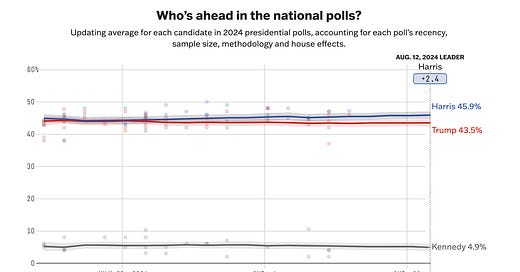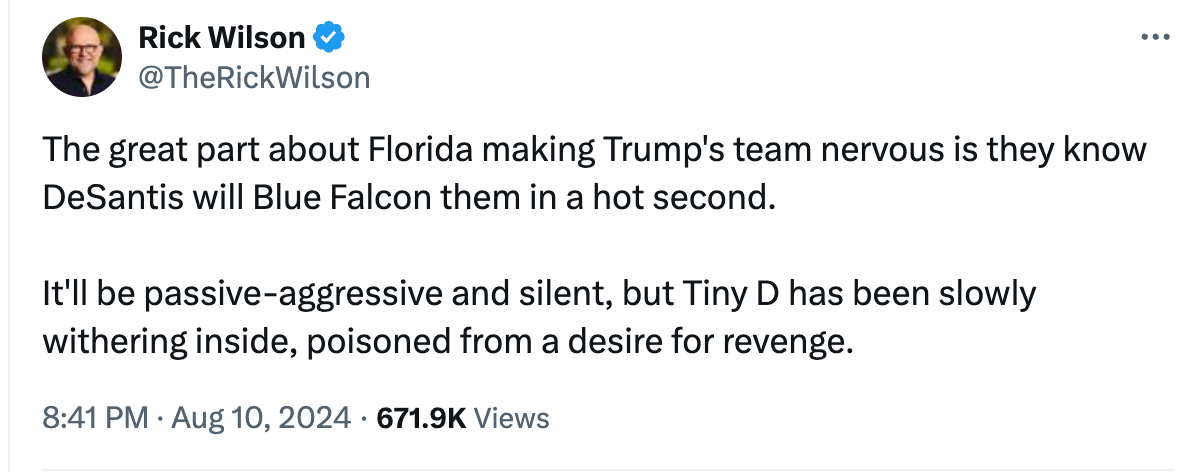“Early polling indicates a renewed interest in the campaign overall — and it’s not just polling. The fundraising has been a bigger boon than even the most optimistic Democrats anticipated. The various “attention metrics,” like TV ratings and social media trends, also show interest in the campaign is up near levels in 2008 and 2020, two of our higher interest/turnout elections of my lifetime. That’s after having been down at unusually low levels before.”
Chuck Todd, NBC News
The polling continues to get better for Harris, but it is still close in a lot of places - and nationally. She is up by 2.4 points in the 538 polling average. The New York Times, however, has her only a point over Trump in the two-way race. However, she is up by two points when Kennedy is included (which is how 538 reports its average).
Harris should continue her lead in the polls through next week’s Democratic National Convention. The DNC may even give her a bump in support, which may or may not wane afterwards. However, immediately after the DNC is Labor Day, the unofficial - but very real - start of the fall campaign season. This is when most voters start really paying attention to the races. If Harris has solidified a lead by this time, Trump may be playing catch-up for the remainder of the race.
Source: 538
We know that the national polling is not dispositive of who wins the election. To be elected president, one must win an absolute majority in the Electoral College, which is 270 votes. This makes certain states - sometimes called swing states, but I prefer the term battleground states - much more important than others. These are the states that can plausibly be won by either party and in some combination make up the delta of electoral support needed for a candidate to win when added to the votes from safe or expected states. We finally have enough polling in some battleground states to have an idea of how well Harris is doing. And she is doing well. Biden was losing - and may very well have already lost - every battleground state. In fact, on the eve of his withdrawal from the race states like Virginia, Minnesota, New Hampshire, and even New Mexico were threatening to become battlegrounds. This is one reason why Republicans thought that Trump was on his way to a landslide which would bring the Senate and House with him. Then, in 48 hours, everything changed.
Source: New York Times
Siena released surveys of Pennsylvania, Michigan, and Wisconsin yesterday. These are the “Blue Wall” states, which at one time helped ensure Democratic victories in the Electoral College. The wall fell in 2016, but was rebuilt in 2020. It stands uneasy with races remaining close there. Even after the June debate, Biden was hanging close in these states. Yesterday, Siena revealed that it’s polling has Harris winning each state by four points (with her reaching 50% in the two-race). This could be an outlier, but the only thing at the moment that is surprising is the margin she is winning by. Other Blue Wall polling has shown Harris in small leads. And that’s not all. Over the weekend YouGov released a poll in North Carolina showing the state tied at 46%. The sponsor of the poll was a Democratic PAC, so we might caution ourselves about a house effect. However, YouGov is a solid pollster. If this result is not correct, it at least shows the race there is competitive. North Carolina remains a battleground state.
Source: New York Times
Here’s the problem for Trump. He needs to win all of the battleground states.1 Harris only needs to win the Blue Wall states and NE-02. That was true for Biden as well, except he was losing the Blue Wall and on the verge of getting blown out in the rest of the battleground states. But since Harris became the presumptive nominee, she has made all battleground states competitive. Trump’s edge was in racking up Georgia, North Carolina, Arizona, and Nevada in his column and then expanding the map so Biden had to invest resources in places like Virginia and New Mexico, which would take away from him making advances in the Blue Wall. The tables have no been turned. Trump is in trouble in North Carolina and Georgia. Recent polling in Nevada makes Republican victories there in any federal race seem increasingly unlikely if trends continue. Arizona, which continues to support Rep. Ruben Gallego (D) for Senate, has seen erratic presidential polling recently from Harris +3 to Trump +5. According to Trump’s own pollster, Tony Fabrizio, Georgia is even at 48%.
So, how is Trump campaigning? Well he was in Montana last week while Harris and her running mate were barnstorming across the battlegrounds states. He has made a huge media buy in Georgia, but relatively nothing in the other battleground states. And Republicans are nervous about Florida now. What is this all about?
Trump has made no secret that he is running a revanchist campaign. He plans to exact revenge on his perceived enemies once in office. We focus a lot on how he is running to stay out of prison. While that is undoubtedly true as well, the more instructive part of his motive is revenge. And this may be his undoing. He is focusing way too much on personal grievance in his public statements. His recent press conference was an absolute disaster and not likely to make one voter, who is not already in his cult, think, “this guy might be the better choice.” And now his campaign resources seem to be going to exacting revenge on political opponents and buffering the campaign for retribution from them.
Trump was in Montana for one reason: he hates Sen. Jon Tester (D), who is running for reelection. Tester opposed Trump’s appointment of disgraced former doctor Ronny Jackson to be Secretary of Veteran Affairs. Jackson is now a member of the House’s GOP wingnut faction. Trump is up +15 in Montana, a state he won by 16.5 points in 2020 and over 20 in 2016. While his support there seems to be decreasing over time, it is absolutely not the place he should be spending valuable campaign time and resources. But he wants to stick it to Tester, so that’s where he is.
The Georgia media buy is harder to read at the moment, but there is reason to think he may use some of that airtime to attack Republican leaders there. He hates Gov. Brian Kemp and Secretary of State Brad Raffensperger for not doing everything in their power to fix the 2020 election there to his advantage. Instead, both officials did their jobs and made it clear that Biden won the Peach State. Trump’s fascination with winning Georgia has always been odd since he still would have lost the election if he had won the state. It may be that he was hoping to use that kind of chaos to get Justice Clarence Thomas to issue an emergency injunction on the election and get the full Court to find a way to throw the election to Trump. The simpler, and perhaps more likely, reason might be that Trump could not understand how it was possible for him to lose a southern state. He spent so much time claiming the Georgia election was rigged and stolen from him, that he probably convinced enough of his supporters to stay home in the dual run-offs for Senate in January 2021 - sending two Democrats to replace two Republicans in the US Senate in the process.
But even if the Trump campaign is not going to use the media buys to attack Kemp and other Republicans, the question remains why so much here and so little in other battleground states that he needs to win. Some of it might have to do with the relative size of the states and media markets (and, to be fair, the campaign has already spent money in other states). But Trump still seems to have a lot of his oversized ego at stake in Georgia’s outcome. Taegan Goddard believes that the reason is that if “Georgia is in play, that opens up many more paths to 270 electoral votes for Harris.” Chris Cillizza notes that if Harris wins Georgia, she can afford to lose Pennsylvania and another battleground states and still win the election. However, that is also true for North Carolina, but perhaps the Trump campaign does not yet believe that it is in play. And more importantly, if Harris wins Georgia, she is winning those other states too.
Or, as more than one colleague of mine has mused, maybe there is some grift going on in Georgia. With Trump, you can never rule out grift.
Why are Republicans worried about Florida? Here, they seem more concerned about Gov. Ron DeSantis (R) getting revenge on Trump for the way he treated him during the 2024 primaries. Rick Wilson believes - correctly, in my opinion - that DeSantis will not directly attack Trump but be less-than-helpful behinds the scenes. The buzz out there suggests that there may be internal polling among Republicans that is causing some concern. What we have seen is the collapse of support for Sen. Rick Scott (R) since April as Democratic challenger Debbie Mucaresel-Powell has made an intensive effort to introduce herself to the statewide electorate. Scott was polling in double-digits in April, but has seen his lead cut to about four points recently. There is not a lot of public polling in Florida, but Scott seems to have himself in a much closer race than he thought. Finally, Republicans are concerned about the impact of an abortion rights ballot question in November. Trump, a Florida resident, refused to answer how he would vote on this question - or one which would legalize recreational cannabis - in his recent press conference. Both measures have more than the 60% support they need to pass according to a recent poll by the University of North Florida. That poll showed Trump winning by six points and Scott by four points. At the time the poll was in the field, Harris had only been in the race for about a week.
Needless to say, no Republican can win the presidency today without Florida’s 21 electoral votes. The polling does not suggest Trump will lose the state, but there are indications he might have to pay attention to it. If Harris’ support continues to trend upwards nationally, this may have an impact in the Sunshine State. Combined with a close Senate race and two ballot questions that may energize the opposition, Republicans are right to be concerned that Florida could upend their campaign and take resources away from the battleground states Trump absolutely needs to win.
I assume we will see more polling in the next week before the DNC begins. Once Labor Day comes, we should see a lot of polling at the state level and that will gives us a better idea of where the race really is. As of today, Harris is in good shape.
He can get to 270 by winning North Carolina, Pennsylvania, Georgia, Nevada, and Arizona. However, while possible, it is unlikely that this combination would happen. The Blue Wall states will probably vote the same way.






